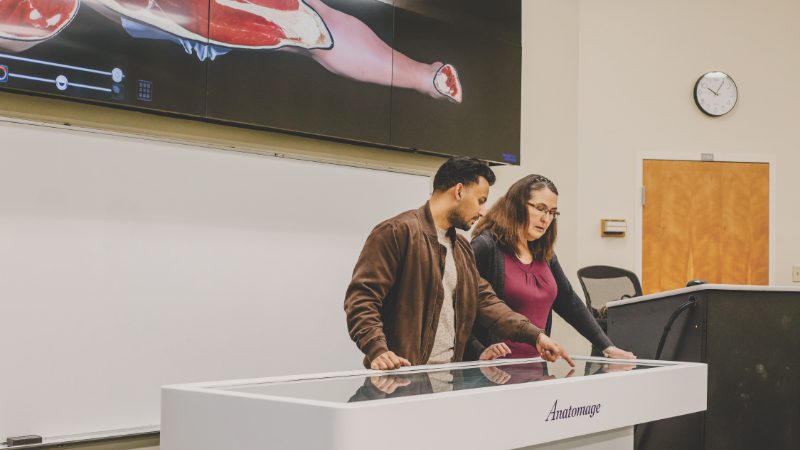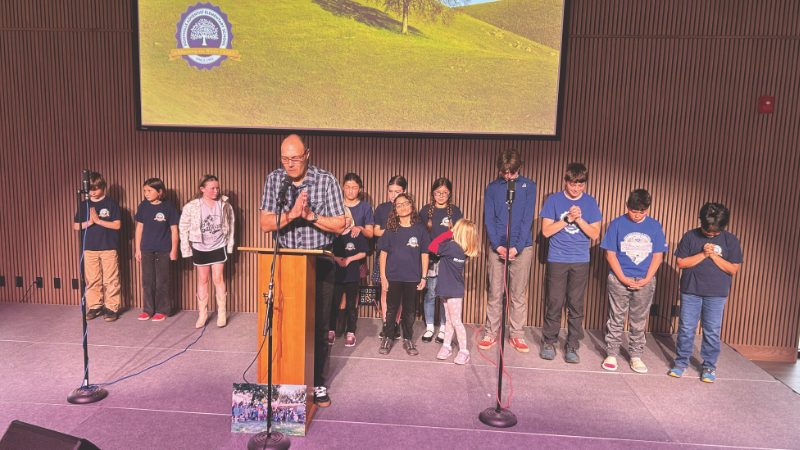Confession: Both Adbni and I cried during our conversation about Adventist education. She was on a break from work, sitting in her scrubs in an empty consult room, and as she tried to describe to me the impact of Adventist education on her life, she waved her hands around the room and over herself and said with tears in her eyes, “This is the hill I will die on. Everything I am today is because of Adventist education. Everything.” And that’s when I wept, too.
Here in front of me was this beautiful, polished, articulate, and accomplished young woman who’d made it her life work to give back to the community with her medical skills and knowledge acquired from years of education—and she could not stop talking about the teachers who gave her rides to school, who came to her graduation, who went to church with her, who were role models in her life and showed her how she could succeed.
Adbni was the first person in her family to graduate from high school. Teenage sweethearts and newly married, her parents immigrated from Mexico and settled in California. Armed with a sixth-grade education, a fumbling grasp of English, and dreams of a different life for their children, they put down roots in the Tujunga community and started working. “And they never stopped. Sometimes they worked three different jobs so that they could provide for my brother and me.” Adventist education should’ve been out of the question for the Palafox family, but they trusted that God would provide. “It was like the story in the Bible about the woman and her oil. Elijah told her to keep pouring it out, keep using it—and somehow, there was always oil.” Adbni shook her head as she recounted the times where her parents weren’t going to make the tuition payments for the month and somehow, something—whether through an anonymous donor or a church member’s help or a scholarship—came in for their account.

While at Newbury Park Adventist Academy, Adbni had the opportunity to visit various Adventist colleges through school-led trips. A practice that most academies across the country enjoy, teachers took the senior class to Walla Walla University, Pacific Union College, and La Sierra University. “That was the expectation in academy. Everyone talked about college like it was the norm. It wasn’t a matter of if you were going to go—the question was where are you going?” While other parents may have helped their children with college applications and campus tours, as a first-generation prospective college student, Adbni relied solely on the guidance of her teachers and community. She had significant fears of being able to afford college, but her high school principal and teachers constantly reassured her that the degree that she earned would pay for itself in the long run.
And so Adbni dove into her nursing classes at PUC and, just a few short years later, obtained her Registered Nurse licensure. Loma Linda University Medical Center (LLUMC) hired her immediately and promised to sponsor her through her Bachelor of Science in Nursing (BSN). Adbni began working in the surgical oncology ward while studying hard in between shifts. After three years, she transferred to the Emergency Department, quickly moving her way up to become team lead. While there, she also trained to become a mobile intensive care nurse (MICN), an invitation-only position offered to the department’s top-performing nurses. It was a high-pressure role that required quick thinking as MICNs were responsible for managing ambulance traffic for the entire Inland Empire in Southern California. All ambulances connected to the main call center, and Adbni would direct them to the appropriate hospital, based on which had the most resources, which had open beds, etc.
After she finished her BSN in 2014, LLUMC sponsored her through a second degree—a Doctorate of Nursing Practice (DNP). Again, Adbni worked while taking classes, often showing up for her shifts bleary-eyed from a late-night study session. “My bosses were so kind; they’d say, ‘Adbni, we’re OK for a bit, go take a nap, go change, go freshen up.’ They really helped me through those tough years.” She graduated in 2019 and, through a series of divine connections and conversations, was hired by Advent Health to work as a family nurse practitioner in Hanford, California.
“Adventist education is really a lifestyle, not just a school, not just a religion we practice on the weekends,” Adbni stressed. “All the concepts and values—they’re all intertwined.” She listed off the ways in which compassion, service, and grace were continually modeled and communicated in her school. “It’s through Bible classes and devotionals and chapels, yes—but it’s also repeated over and over in what our teachers told us, in what we were surrounded by in school.”
Her teachers, Adbni remarked, not only taught them about Jesus and about living for Him, but they also conveyed that through their actions. Her fourth-grade teacher often picked her up to take her to school because she knew that transportation was difficult for Adbni’s family. Other teachers took time to tutor her and her brother in the summer, making sure that they were caught up and ready for the new academic year. She recalled that her teachers always encouraged her to be better, to do better, to never be stagnant. She knew they wanted her to succeed. “My younger brother passed the bar exam recently and his eighth-grade principal saw his post on Facebook and commented, ‘We’re so proud of you—congratulations!’ His eighth-grade principal!”
This, she marveled, was their village, their community that saw them through from childhood through adulthood. “And those school loans—I did pay them, just like my teachers said I would. Every penny that has gone into my Adventist education has paid off in dividends.”
Adventist education is really a lifestyle, not just a school, not just a religion we practice on the weekends.


Adbni Palafox currently works as a nurse practitioner for Skin Perfect Medical, a private office in Lancaster, California.
La aldea educativa adventista
Por Aimee Leukert
Confesión: Tanto Adbni como yo lloramos durante nuestra conversación sobre la educación adventista. Estaba en un descanso del trabajo, sentada en su ropa quirúrgica en una sala de consulta vacía, y mientras trataba de describirme el impacto de la educación adventista en su vida, agitó sus manos alrededor de la habitación y sobre sí misma y dijo con lágrimas en los ojos: «Esta es la colina en la que moriré. Todo lo que soy se debe a la educación adventista. Todo». Y fue entonces cuando yo también lloré.
Ahí, frente a mí, estaba esa joven hermosa, pulida, elocuente y consumada que había hecho del trabajo de su vida retribuir a la comunidad con sus habilidades médicas y conocimientos adquiridos durante años de educación, y no podía dejar de hablar de los maestros que la llevaron a la escuela, que fueron a su graduación, que fueron a la iglesia con ella, que fueron modelos a seguir en su vida y le mostraron cómo podía tener éxito.
Adbni fue la primera persona de su familia en graduarse de high school. Novios desde la adolescencia y recién casados, sus padres emigraron de México y se establecieron en California. Armados con una educación de sexto grado, un dominio torpe del inglés y sueños de una vida diferente para sus hijos, echaron raíces en la comunidad de Tujunga y comenzaron a trabajar. «Y nunca se detuvieron. A veces tenían tres trabajos diferentes para poder mantenernos a mi hermano y a mí». La educación adventista debería haber estado fuera de discusión para la familia Palafox, pero confiaban en que Dios proveería. «Era como la historia de la Biblia sobre la mujer y su aceite. Elías le dijo que siguiese virtiéndolo, que siguiese usándolo, y de alguna manera, siempre había aceite». Adbni negó con la cabeza mientras relataba las veces en las que sus padres no podían hacer los pagos de la matrícula del mes y, de alguna manera, algo —ya fuese a través de un donante anónimo o la ayuda de un miembro de la iglesia o una beca— llegaban fondos para pagar su colegiatura.

Durante su estancia en Newbury Park Adventist Academy, Adbni tuvo la oportunidad de visitar varios colleges adventistas a través de viajes guiados por la escuela. Una práctica que la mayoría de las academias de todo el país disfrutan, los maestros llevaron a la clase de seniors a Walla Walla University, Pacific Union College y La Sierra University. «Esa era la expectativa en la academia. Todo el mundo hablaba de ir a college como si fuese la norma. No era una cuestión de si ibas a ir, la pregunta era ¿a dónde vas a ir?» Si bien otros padres pueden haber ayudado a sus hijos con las solicitudes y los recorridos por el campus, como futura estudiante de college de primera generación, Adbni dependió únicamente de la orientación de sus maestros y la comunidad. Tenía grandes temores de poder pagar esas colegiaturas pero el director de su escuela y sus maestros le aseguraban constantemente que el título que obtenía se pagaría solo a largo plazo.
Y así, Adbni se sumergió en sus clases de enfermería en PUC y, solo unos pocos años después, obtuvo su licencia de Enfermera Registrada. Loma Linda University Medical Center (LLUMC) la contrató de inmediato y prometió patrocinarla a través de su Licenciatura en Ciencias en Enfermería (BSN). Adbni comenzó a trabajar en la sala de oncología quirúrgica mientras estudiaba mucho entre turnos. Después de tres años, se transfirió al Departamento de Emergencias, ascendiendo rápidamente hasta convertirse en líder del equipo. Mientras estuvo allí, también se capacitó para convertirse en enfermera móvil de cuidados intensivos (MICN), un puesto al que solo se puede acceder por invitación y que se ofrece a las enfermeras de mejor rendimiento del departamento. Era un papel de alta presión que requería un pensamiento rápido, ya que las MICN eran responsables de gestionar el tráfico de ambulancias para todo el Inland Empire en el sur de California. Todas las ambulancias se conectaban al centro principal de llamadas, y Adbni las dirigía al hospital apropiado, en función de cuál tenía más recursos, cuál tenía camas disponibles, etc.
Después de terminar su BSN en 2014, LLUMC la patrocinó a través de un segundo grado: un Doctorado en Práctica de Enfermería (DNP). Una vez más, Adbni trabajaba mientras tomaba clases, a menudo presentándose a sus turnos con los ojos somnolientos después de una sesión nocturna de estudio. «Mis jefes fueron muy amables; me decían: “Adbni, estamos bien, ve a tomar una siesta, ve a cambiarte, ve a refrescarte”. Realmente me ayudaron a superar esos años difíciles». Se graduó en 2019 y, a través de una serie de conexiones y conversaciones divinas, fue contratada por Advent Health para trabajar como enfermera practicante familiar en Hanford, California.
«La educación adventista es realmente un estilo de vida, no es solo una escuela, no es solo una religión que practicamos los fines de semana», enfatizó Adbni. «Todos los conceptos y valores están entrelazados». Enumeró las formas como la compasión, el servicio y la gracia se modelaban y comunicaban continuamente en su escuela. «Es a través de clases bíblicas, devocionales y capillas, sí, pero también se repite una y otra vez en lo que nuestros maestros nos decían, en lo que nos rodeaba en la escuela».
Sus maestros, comentó Adbni, no solo les enseñaron acerca de Jesús y de vivir para él, sino que también transmitieron eso a través de sus acciones. Su maestra de cuarto grado a menudo la recogía para llevarla a la escuela porque sabía que el transporte era difícil para la familia de Adbni. Otros maestros se tomaron el tiempo para enseñar a ella y a su hermano en el verano, asegurándose de que estuviesen al día y listos para el nuevo año académico. Recordó que sus maestros siempre la alentaron a ser mejor, a hacerlo mejor, a nunca quedarse atrás. Sabía que querían que tuviera éxito. «Mi hermano menor aprobó el examen de abogacía recientemente y su director de octavo grado vio su publicación en Facebook y comentó: “Estamos muy orgullosos de ti, ¡felicidades!” ¡Su director de octavo grado!»
Ese, se maravilló, era su pueblo, su comunidad que los vio desde la infancia hasta la edad adulta. «Y esos préstamos escolares, los pagué, tal como mis maestros dijeron que lo haría. Cada centavo que se ha invertido en mi educación adventista ha dado sus frutos».
«La educación adventista es realmente un estilo de vida, no es solo una escuela, no es solo una religión que practicamos los fines de semana»


Adbni Palafox actualmente trabaja como enfermera practicante para Skin Perfect Medical, una oficina privada en Lancaster, California.





